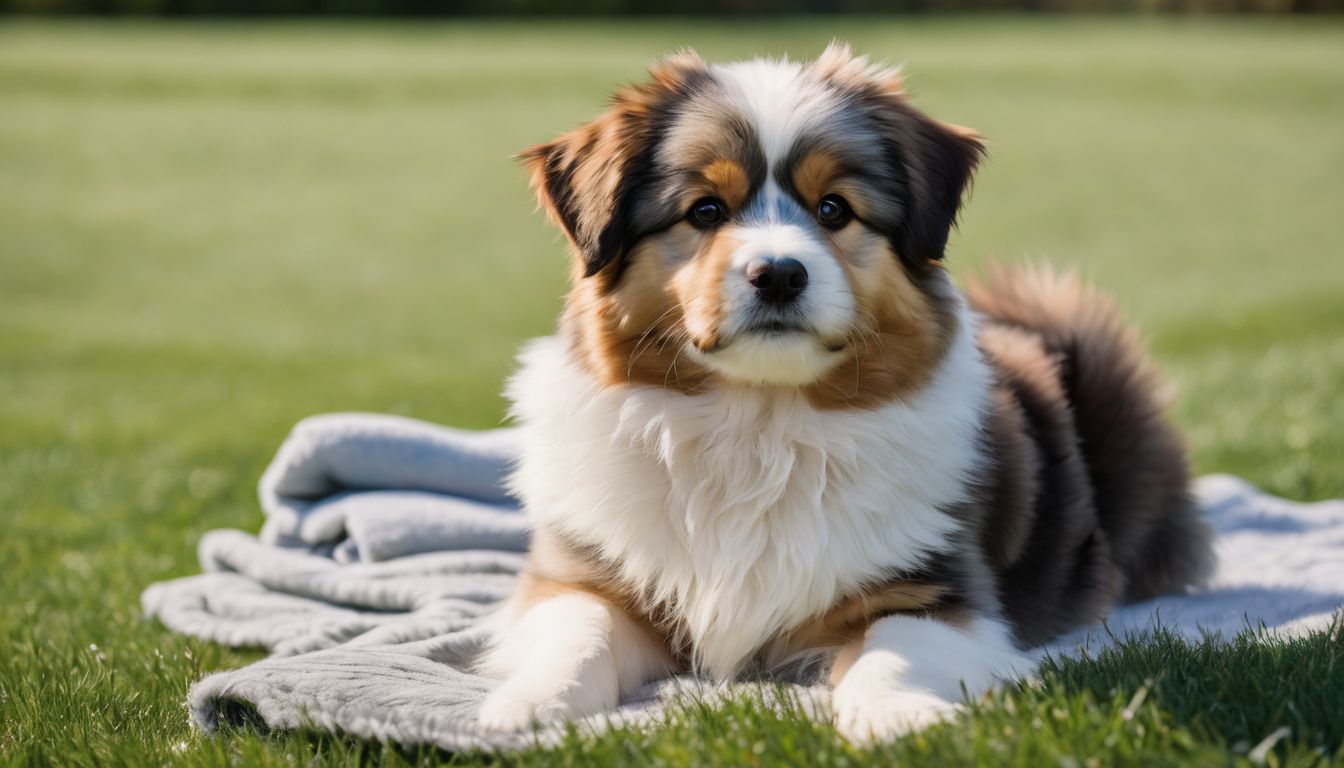Is your dog peeing on his blanket and you’re at a loss as to why does my dog pee on his blanket? This behavior could be the result of various medical or psychological issues that aren’t always easy to identify. Our article will guide you through understanding the possible causes and offer expert solutions for this seemingly strange canine habit.
Trust us, with a little time and patience, your pooch can steer clear of unwanted urination – let’s dive in!
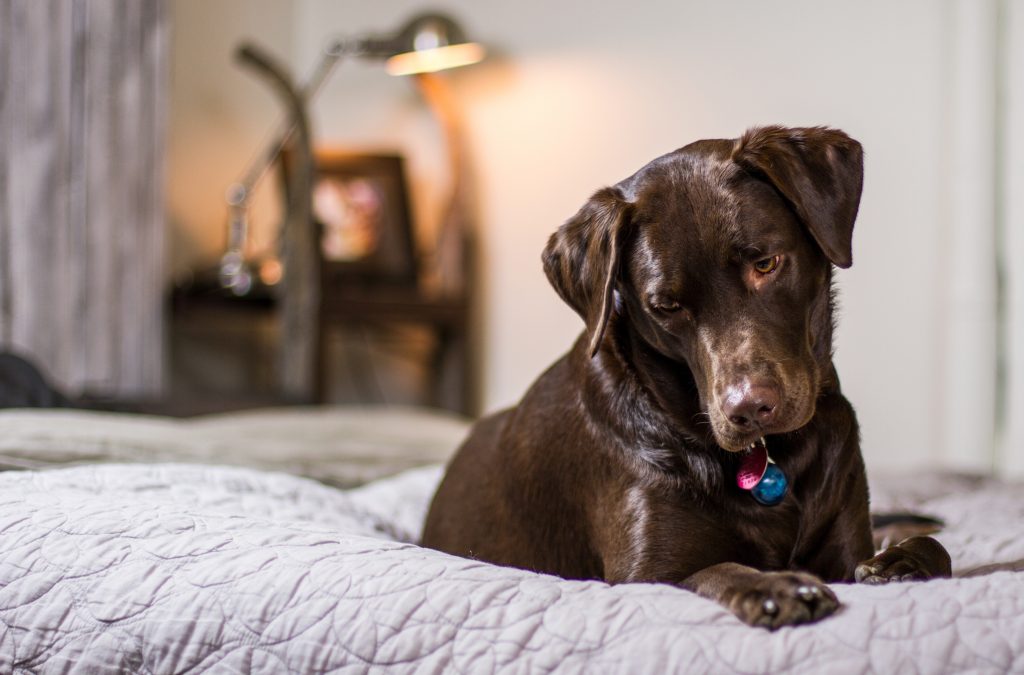
Key Takeaways
- Dogs may pee on their blankets due to medical issues, incontinence, confusion, limited mobility, or stress.
- Medical causes like bladder problems or UTIs should be ruled out by taking your dog to the vet before addressing behavioral issues.
- Proper housetraining, regular potty breaks, and addressing stress and anxiety can help prevent dogs from peeing on their blankets.
- Cleaning and removing odors properly is important to discourage your dog from peeing on his blanket again.
Reasons Why Dogs Pee on Their Blankets
Dogs may pee on their blankets due to medical issues, incontinence, confusion, limited mobility, or stress.
Medical Causes
Dogs can get sick, just like us. They can have issues with their bladder or a UTI. A dog might pee on its blanket because it is unwell. Bladder stones and other diseases can also make a dog pee more often.
It’s key to take your pet to the vet if you think they’re not well. The vet will check for these health problems. She may do tests like a blood test or urine test as well.
Incontinence
Hormone-responsive urinary incontinence is a common reason why dogs may pee on their blankets. This condition often affects spayed female dogs. It happens when the muscles that control the bladder weaken and cause involuntary urination.
So, even if your dog is well-trained, they may still have accidents because they can’t hold their urine properly. Hormone replacement therapy or medications can be used to manage this condition and help reduce accidents.
It’s important to consider medical reasons like incontinence before addressing any behavioral or training issues related to your dog peeing on their blanket. By ruling out any health problems first, you can focus on finding appropriate solutions for your furry friend’s specific needs.
Confusion
If your dog is peeing on his blanket, confusion could be one of the reasons behind this behavior. Dogs can get confused about where they should go to the bathroom, especially if their training wasn’t consistent or they haven’t been properly housetrained.
It’s important to provide clear guidance and rewards for good behavior during potty training. Additionally, changes in routine or environment can also cause confusion for dogs, leading to accidents on their blankets.
Creating a consistent schedule and providing plenty of opportunities for outdoor potty breaks can help prevent confusion and establish proper bathroom habits.
Limited Mobility
Some dogs may pee on their blankets or beds due to limited mobility. This could be caused by a variety of factors, such as arthritis, joint pain, or an injury. When a dog has trouble moving around easily, they may not be able to make it outside in time to go potty.
As a result, they might end up peeing on their bedding out of necessity. It’s important to address the underlying mobility issue and provide your dog with the necessary support and accommodations.
This can include using ramps or stairs to help them navigate tricky areas, providing comfortable and supportive bedding that is easy for them to access, and ensuring regular bathroom breaks throughout the day to prevent accidents.
Stress
Dogs can experience stress just like humans do. When a dog is stressed, it may lead to behaviors such as peeing on their blanket or bed. Anxiety and fear are common causes of stress for dogs, especially during situations like thunderstorms or when they are left alone for long periods.
Separation anxiety is another common form of stress that can cause a dog to urinate on their bedding. To help your dog cope with stress and prevent them from peeing on their blanket, it’s important to create a calm and secure environment for them.
This can include providing plenty of exercise, mental stimulation, and positive reinforcement training. Additionally, you may consider using calming aids such as pheromone diffusers or natural remedies recommended by your veterinarian to help reduce your dog’s anxiety levels.
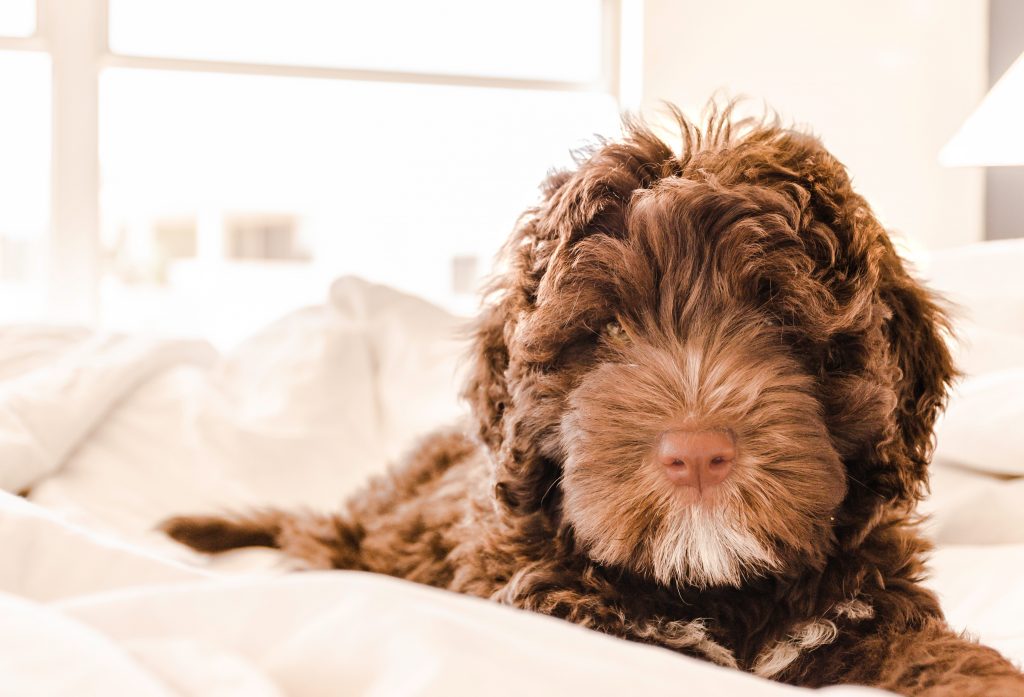
Preventing and Addressing Peeing on Blankets
To prevent and address peeing on blankets, it is important to start with a medical evaluation and treatment, followed by proper housetraining, addressing stress and anxiety, regular potty breaks, and ensuring proper cleaning and odor removal.
Medical evaluation and treatment
If your dog is peeing on his blanket, it’s important to get him evaluated by a veterinarian. Here are some steps you can take:
- Take your dog to the vet for a thorough examination.
- Ask the vet to check for any underlying medical conditions that may be causing the urination problem.
- If necessary, get your dog tested for urinary tract infections or bladder issues.
- Follow the vet’s recommended treatment plan, which may include medication or dietary changes.
- Be consistent with any prescribed medications and follow – up appointments.
Proper housetraining
Housetraining your dog is important to prevent them from peeing on their blanket or bed. Here are some tips to help with proper housetraining:
- Establish a routine: Take your dog outside to the same spot at regular intervals, such as after meals or naps.
- Use positive reinforcement: When your dog pees outside, praise and reward them with treats or playtime.
- Supervise and limit access: Keep an eye on your dog indoors and restrict access to certain areas of the house until they are fully housetrained.
- Crate training: Utilize a crate or small enclosed area when you can’t directly supervise your dog to prevent accidents.
- Clean up accidents properly: Use an enzymatic cleaner to eliminate any lingering odor that might attract your dog to pee in the same spot again.
Addressing stress and anxiety
If your dog is peeing on their blanket, it might be a sign of stress or anxiety. Dogs can experience fear, nervousness, and separation anxiety, which can lead to them urinating inappropriately.
To address this issue, it’s important to create a calm and safe environment for your dog. You can try using calming techniques like providing a comfortable bed or crate training. Additionally, you may want to consider behavioral modification techniques or consult with a professional dog trainer or veterinarian for guidance.
Understanding the specific triggers or reasons behind your dog’s stress and anxiety can help you implement effective solutions and prevent further accidents on their blanket.
Regular potty breaks
To prevent your dog from peeing on their blanket, it’s important to take them for regular potty breaks. Dogs have smaller bladders than humans, so they need to go outside more frequently.
By taking your dog out regularly, you’re giving them the opportunity to relieve themselves in an appropriate place rather than on their bedding. Aim for at least three to four potty breaks a day, especially after meals and playtime.
This will help ensure that your dog doesn’t feel the need to urinate on their blanket due to holding it in for too long or not having access to the outdoors when they need it.
Regular potty breaks can also be helpful in identifying any potential medical conditions that may be causing your dog’s urination issues. If you notice excessive peeing or other changes in bathroom habits during these breaks, it’s essential to consult with a veterinarian who can evaluate your dog and address any underlying health problems that may be contributing to the behavior.
In summary, regular potty breaks are crucial in preventing dogs from peeing on their blankets. By providing frequent opportunities for your dog to relieve themselves outside, you can reduce the likelihood of accidents and promote proper bathroom habits.
Proper cleaning and odor removal
To prevent your dog from peeing on his blanket, it’s important to clean and remove any lingering odors. Here are some tips to help you with proper cleaning and odor removal:
- Use a pet-friendly cleaner: Choose a cleaning solution that is safe for pets and will effectively remove urine stains and odors. Avoid using harsh chemicals that could be harmful to your dog.
- Blot the area: If the blanket is wet from urine, blot the area gently with a clean towel or paper towels to absorb as much liquid as possible.
- Wash the blanket: If the blanket is machine washable, follow the care instructions and wash it in hot water with an enzyme-based detergent. Enzyme cleaners can break down the proteins in urine that cause strong odors.
- Add vinegar or baking soda: To help neutralize odors, you can add a cup of white vinegar or half a cup of baking soda to the washing machine during the rinse cycle. These natural ingredients can help eliminate unpleasant smells.
- Air dry in sunlight: After washing, allow the blanket to air dry outside in direct sunlight if possible. Sunlight helps kill bacteria and naturally freshens fabrics.
- Use an odor-neutralizing spray: Consider using an odor-neutralizing spray designed specifically for pet accidents. These sprays can help eliminate lingering smells.
- Clean other affected areas: If your dog has urinated on other surfaces like cushions or rugs, make sure to clean those thoroughly as well.
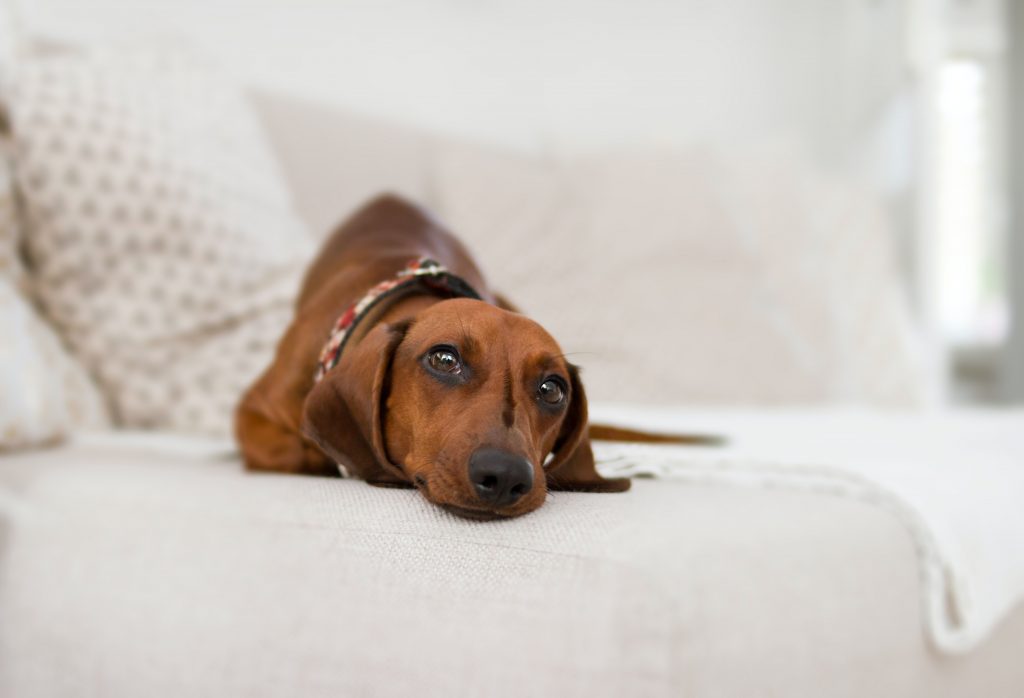
Behavioral Issues and Solutions
Addressing territorial marking can be done through reinforcing proper bathroom habits, crate training, and positive reinforcement.
Territory marking
Dogs have a natural instinct to mark their territory, and sometimes they do this by peeing on their blankets or beds. This behavior is known as urine marking. By leaving their scent through urine, dogs are claiming ownership of the area.
It’s important to note that urine marking is different from regular urination for toileting purposes. Dogs may engage in this behavior when they feel threatened or want to establish dominance over something new in their environment.
While territorial marking can be frustrating for pet owners, understanding the underlying reason behind it can help address the issue effectively.
Reinforcing proper bathroom habits
To prevent your dog from peeing on his blanket, you need to reinforce proper bathroom habits. Here’s what you can do:
- Establish a consistent routine for potty breaks.
- Take your dog outside to the designated bathroom area frequently, especially after meals and naps.
- Use positive reinforcement when your dog pees in the appropriate spot, such as giving treats or verbal praise.
- Avoid punishing or scolding your dog for accidents, as this can create fear or anxiety.
- Clean up accidents promptly and thoroughly to remove any lingering scent that might attract your dog back to the same spot.
- Consider crate training your dog to limit their access to the house until they are fully housetrained.
- Provide plenty of opportunities for exercise and mental stimulation to help relieve any stress or boredom that may contribute to inappropriate urination.
Crate training
Crate training can be helpful in preventing a dog from peeing on their blanket. Here are some tips for crate training:
- Introduce the crate gradually: Start by placing the crate in a quiet and comfortable area of the house. Leave the door open and allow your dog to explore it at their own pace.
- Make it inviting: Put some soft bedding and a few toys inside the crate to make it cozy and inviting. You want your dog to feel comfortable and secure when inside the crate.
- Use positive reinforcement: Encourage your dog to enter the crate by placing treats or their favorite toys inside. Praise and reward them when they willingly go inside the crate.
- Practice short periods of confinement: Start by closing the door for short periods of time while you’re nearby. Gradually increase the duration so that your dog becomes accustomed to being in the crate for longer periods.
- Maintain a routine: Establish a schedule for when your dog goes in and out of the crate, such as during meal times or when you’re away from home. Consistency is key in helping them understand that crate time is not a punishment.
Positive reinforcement
Positive reinforcement is an effective technique for addressing and preventing a dog from peeing on their blanket. By rewarding your dog with treats, praise, or playtime when they urinate in the appropriate place, such as outside or on a designated potty pad, you can encourage them to develop proper bathroom habits.
This positive association helps them understand that peeing in the right spot leads to positive rewards. Consistency and patience are key when using positive reinforcement to train your dog.
With time and repetition, your furry friend will learn where they should pee and reduce the likelihood of accidents on their blanket.
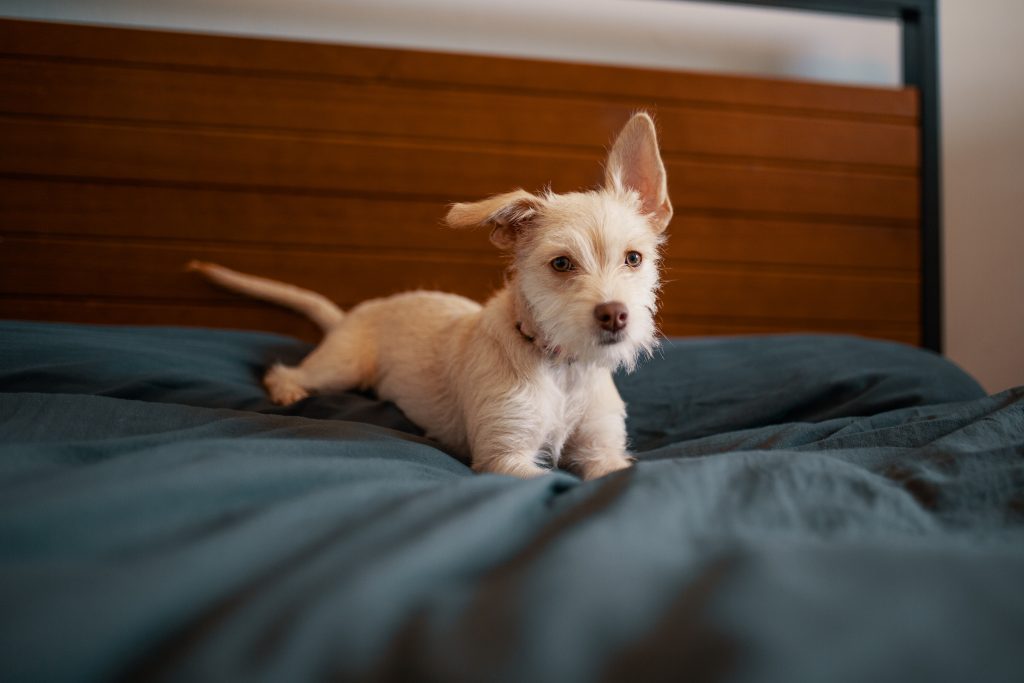
Conclusion
In conclusion, if your dog is peeing on his blanket, it could be due to medical issues, anxiety or stress, or marking behavior. It’s important to rule out any health problems and address any underlying emotional issues.
With proper training and a safe environment, you can help prevent this behavior and keep your dog comfortable and happy.
FAQs
1. Why is my dog peeing on his blanket?
Your dog might be peeing on his blanket due to distress, anxiety, or territorial behavior. It could also be due to health issues like a UTI Urinary Tract Infection.
2. Could canine bladder issues cause urination on blankets?
Yes! Canine bladder problems can lead to your dog urinating unexpectedly and often this could happen to their bedding.
3. Is it true that dogs mark territory by peeing on blankets?
Territorial marking behavior in dogs can result in them peeing on things like blankets as an act of claiming space.
4. How do I stop my dog from peeing on the bed and blankets?
Preventing dogs from urinating involves training, housebreaking tactics, and addressing any stress or anxiety causing such destructive behavior.
If your dog is showing sudden changes like submissive urination or unexpected behaviors—like repeated pee accidents—it’s likely sending out distress signals which should not be ignored.


